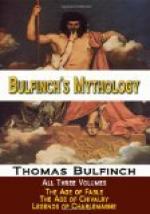He died, and left the kingdom to his sons, who reigned with various fortunes, but were not long-lived, and left no offspring, so that Elidure was again advanced to the throne, and finished the course of his life in just and virtuous actions, receiving the name of the pious, from the love and admiration of his subjects.
Wordsworth has taken the story of Artegal and Elidure for the subject of a poem, which is No. 2 of “Poems founded on the Affections.”
LUD
After Elidure, the Chronicle names many kings, but none of special note, till we come to Lud, who greatly enlarged Trinovant, his capital, and surrounded it with a wall. He changed its name, bestowing upon it his own, so that henceforth it was called Lud’s town, afterwards London. Lud was buried by the gate of the city called after him Ludgate. He had two sons, but they were not old enough at the time of their father’s death to sustain the cares of government, and therefore their uncle, Caswallaun, or Cassibellaunus, succeeded to the kingdom. He was a brave and magnificent prince, so that his fame reached to distant countries.
CASSIBELLAUNUS
About this time it happened (as is found in the Roman histories) that Julius Caesar, having subdued Gaul, came to the shore opposite Britain. And having resolved to add this island also to his conquests, he prepared ships and transported his army across the sea, to the mouth of the River Thames. Here he was met by Cassibellaun with all his forces, and a battle ensued, in which Nennius, the brother of Cassibellaun, engaged in single combat with Csesar. After several furious blows given and received, the sword of Caesar stuck so fast in the shield of Nennius that it could not be pulled out, and the combatants being separated by the intervention of the troops Nennius remained possessed of this trophy. At last, after the greater part of the day was spent, the Britons poured in so fast that Caesar was forced to retire to his camp and fleet. And finding it useless to continue the war any longer at that time, he returned to Gaul.
Shakspeare alludes to Cassibellaunus, in “Cymbeline”:
“The famed Cassibelan,
who was once at point
(O giglot fortune!)
to master Caesar’s sword,
Made Lud’s town
with rejoicing fires bright,
And Britons strut with
courage.”
KYMBELINUS, OR CYMBELINE
Caesar, on a second invasion of the island, was more fortunate, and compelled the Britons to pay tribute. Cymbeline, the nephew of the king, was delivered to the Romans as a hostage for the faithful fulfilment of the treaty, and, being carried to Rome by Caesar, he was there brought up in the Roman arts and accomplishments. Being afterwards restored to his country, and placed on the throne, he was attached to the Romans, and continued through all his reign at peace with them. His sons, Guiderius and Arviragus, who made their appearance in Shakspeare’s play of “Cymbeline,” succeeded their father, and, refusing to pay tribute to the Romans, brought on another invasion. Guiderius was slain, but Arviragus afterward made terms with the Romans, and reigned prosperously many years.




